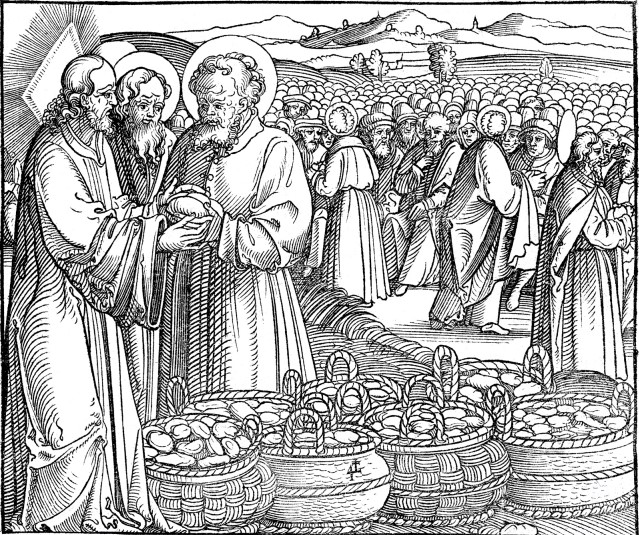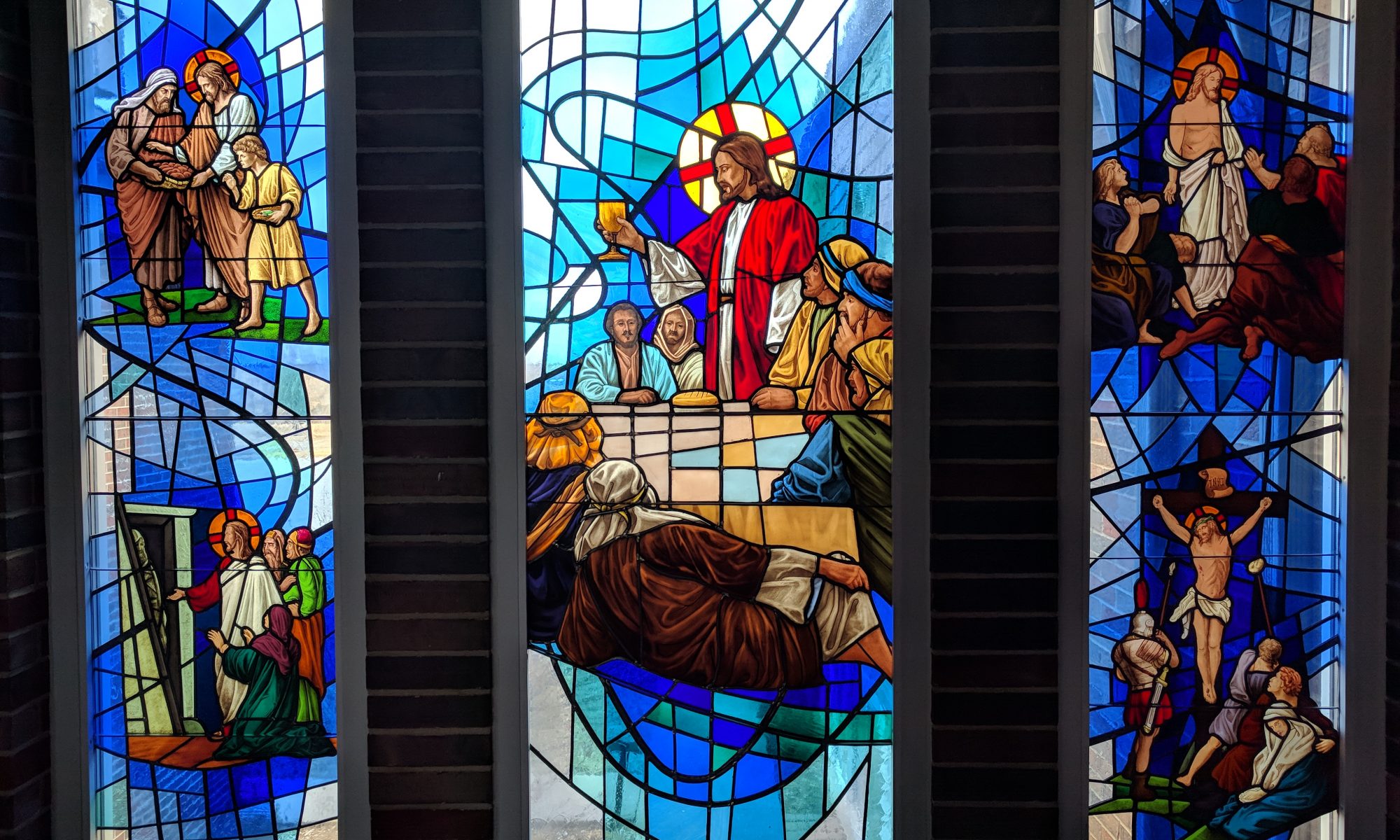
Lessons: Genesis 2:7-17, Romans 6:19-23, Mark 8:1-9
Hymns: LSB 616, 819, 563, 585, 918
Grace, mercy, and peace to you from God our Father and our Lord and Savior, Jesus Christ. Amen.
Christian churches believe in the Holy Trinity. Churches which reject the teachings of the three creeds are not Christian. While some churches agree with the doctrine of the creeds, they do not confess them in worship or help Christians to learn them by heart. While sad, we recognize them as Christian. The work of our Triune God and how He gracious provides for us are evident in today’s Scripture lessons.
The Catechism divides the Creeds into three parts—one part for each person of the Trinity. We believe in God the Father Almighty, Maker of Heaven and Earth. Our Old Testament lessons recounts the special way God made man on the sixth day of Creation. Except for mankind, God made all creation by speaking. God said, “Let there be light,” and there was light. God said, “Let the earth sprout vegetation, plants yielding seed, and fruit trees bearing fruit in which is their seed, each according to its kind, on the earth.” And it was so (Gen. 1:11). At the end of each day, God saw His creation and called it good.
How things came into being is still debated among many in the scientific world. I’ve seen articles lately by non-Christian scientists arguing for a new theory of evolution. The honest ones know the current theories are faulty. While they are engaging in their debates, we know the answer is provided by God in the clear teachings of the Bible. God created the universe in six 24-hour days by speaking.
In Genesis, God formed dust from the ground and breathed into his nostrils the breath of life, making the first man, Adam. God made a garden and placed Adam there to work it and keep it.
Despite calling His creation good, God found something that was not good. Adam was alone. And “God said, ‘It is not good that the man should be alone; I will make him a helper fit for him…’ So the Lord God caused a deep sleep to fall upon the man, and while he slept took one of his ribs and closed up its place with flesh. And the rib that the Lord God had taken from the man He made into a woman and brought her to the man” (Gen. 2:18-22). Adam was filled with joy, for he now had Eve as his wife. After making mankind, “God saw everything that He had made, and behold, it was very good. And there was evening and there was morning, the sixth day” (Gen. 1:31).
God took great care in making all that He made. It is fascinating to see how many different creatures—from tiny microorganisms to huge mammals—God designed as part of a wonderful and beautiful world. We depend on other life God made for our own survival.
God’s wonderful work in this universe did not end at Creation. As we confess the explanation to the Creed, “I believe that God has made me and all creatures… and still takes care of them.” You see, God graciously provides for His creation. Not even the sparrow falls to the ground apart from the will of the Father (Matt. 10:29). This means God graciously provides for you. He brought you into this world. He takes care of you. He gives you what you need to live.
He even does this for His fallen creation. God gave Adam just one prohibition in the Garden of Eden—don’t eat of the tree of the knowledge of good and evil. And Adam and Even could not resist. They ate, bringing all creation into sin.
Isn’t that how temptation usually works? Tell someone don’t do it and it brings about all sorts of desire to do it. Tell the child, “Don’t take cookies from the cookie jar” and the child will begin to think “I never thought about helping myself” and looks for chances to get into the cookie jar. Just a few verses after our Epistle, St. Paul reflects, “If it had not been for the law, I would not have known sin. For I would not have known what it is to covet if the law had not said, ‘You shall not covet.’ But sin, seizing an opportunity through the commandment, produced in me all kinds of covetousness” (Rom. 7:7-8).
Adam and Eve’s sin resulted in many curses. Enmity with God. Total corruption. Death. Their sin is passed on to us so that we are born sinners. As hard as we may try, we cannot make ourselves righteous. We cannot atone for our own sin. And so, God promised to Adam and Eve a Savior—a Man who will be born of a virgin—the Son of God who will take away the world’s sin. God sent His only begotten Son to atone for our sins, reconcile us with God, cover us with His very righteousness, and grant us the gift of eternal life. We didn’t deserve these wonderful blessings, but God, according to His gracious nature, provides for us. He provided the ram as the substitute for Isaac. And He provided the Lamb (His Son) as the substitute for us. We believe in Jesus Christ, His only Son, our Lord who redeemed us “with His holy, precious blood and… innocent suffering and death.”
We see a picture of this great compassion of God and His providing ways in today’s Gospel. For three days, Jesus preached to the multitude and healed many people. In fact, the crowd marveled, for, as Matthew 15:31 records, “They saw the mute speaking, the crippled healthy, the lame walking, and the blind seeing. And they glorified the God of Israel.” Jesus was providing for their physical and spiritual needs. Healing people helped them physically and proved Jesus is the promised Messiah. By preaching, He fed them spiritually, increasing their faith.
Now that three days have passed, they are running out of food. He does not want to send them away without eating something, or else they would faint on the way. He has compassion on the crowd. The Greek word for compassion is splachna, “which refers to the bowels or the inner being of a person. In English, an expression that is similar is ‘to have butterflies in the stomach.’ Splachna does not refer to ‘butterflies’ or nerves, but to the deep ache and hurt that a person has for another person. Quite literally, your guts can hurt for another
person” (Harrison, Journal of Mission, Feb. 2015). That’s the compassion Jesus had on the multitude. And that’s the compassion He has on you.
This compassion led Jesus to feed the 4,000 (which, by the way, happened at some point after Jesus fed the 5,000). Using just seven loaves of bread and a few small fish, the people ate as much as they wanted. This miracle demonstrates Jesus is God as the Creeds testify, reveals the profound compassion which leads Him to provide for the crowd, and teaches us something about how Jesus can take what seems to be a little and make it work for many. Jesus took what should have been enough food for a few families and fed the multitude.
When Jesus goes to the cross, He pays for the sins of the entire world. It may seem like He could only render satisfaction for a few people. After all, how far can the blood of one person go to answer for the sins of others? But Jesus, being God, can do far more. He answers for all sinners, and He pays for all sins of all sinners. There’s not a single sin Jesus left out when He suffered God’s wrath on the cross and shed His Blood. This also teaches us something about the Lord’s Supper. Even though Jesus has ascended into Heaven, He can be present everywhere. In fact, He joins Himself to the bread and wine in a supernatural way. You can be confident that you are receiving the Body and Blood of Jesus in Holy Communion. Just as He could feed the multitude with little, so also, He feeds Christians around the globe in Holy Communion, imparting His forgiveness to all who believe. This shows, yet again, how God graciously provides.
After Jesus rose victoriously from the dead (proving the Father accepted the sacrifice Jesus made on our behalf) and ascended into Heaven, Jesus sent the Holy Spirit to guide us into the way of truth. God provided by giving us that which is complete—the Old and New Testaments—to learn of who God is and how to achieve eternal life. The Holy Spirit sanctifies us. To sanctify is to make holy. The Holy Spirit grants us the holiness of God as He works faith in us through His Word. When He sanctifies us, He sets us free from sin. The end work of God is, as we heard in our Epistle, eternal life.
We were once alive to sin and dead to God. We were once on the path to eternal perdition. But then God stepped in and graciously provided for us. He visited us through His Word and Sacrament. He made us alive through Baptism. He joined us to the death of Christ as we died to sin in Baptism, and He joined us to the resurrection of Christ as we rose to newness of life. So we present ourselves as slaves to righteousness leading to sanctification—to holiness (Rom. 6:19).
We “believe in the Holy Spirit, the Holy Christian Church…” For God “the Holy Spirit called [us] by the Gospel, enlightened [us]with His gifts, sanctified and kept [us]in the true faith.” He works through His Church to impart to us the blessings of Christ.
Our final two verses of today’s epistle speak of incredible blessings from God—signs of His great compassion and evidence God graciously provides. It is written, “Now that you have been set free from sin and have become slaves of God, the fruit you get leads to sanctification and its end, eternal life. For the wages of sin is death, but the free gift of God is eternal life in Christ Jesus our Lord” (Rom. 6:22-23). Because of this, Paradise awaits you. God will restore His creation to perfection. He will raise you up on the Last Day as completely whole and righteous. You will dwell with Him to all eternity. What great blessings you have from our Triune God! He graciously provides for you—by sustaining this world despite its fallenness, redeeming you through His Son, and sanctifying you through His Spirit. Truly, He does all things well. Amen.
The peace of God which passes all understanding keep your hearts and minds in Christ Jesus to life everlasting. Amen.

